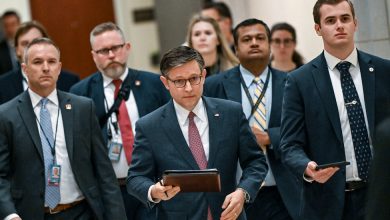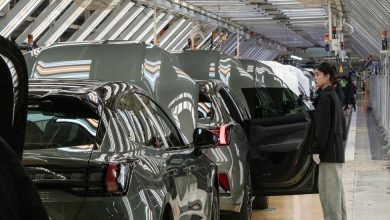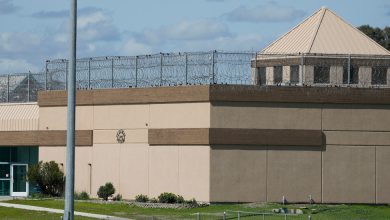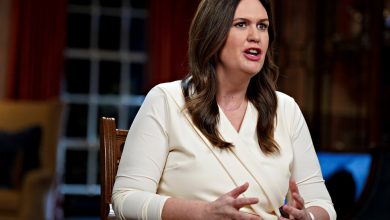Your Thursday Briefing: U.N. Accuses China of Possible ‘Crimes Against Humanity’
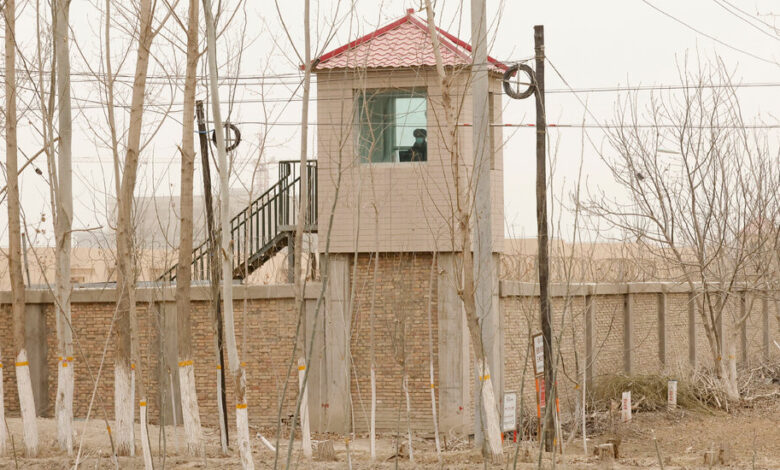

A security guard at a detention center in Yarkant County, Xinjiang, China, last year.Credit…Ng Han Guan/Associated Press
U.N. accuses China of possible ‘crimes against humanity’
A report from the U.N.’s human rights office accused China of serious human rights violations that “may constitute international crimes, in particular crimes against humanity,” in its mass detention of Uyghurs and other predominantly Muslim groups in its western region of Xinjiang.
The assessment was published minutes before Michelle Bachelet, the U.N. high commissioner for human rights, was set to leave office. Its release ended a nearly yearlong delay that had exposed Bachelet to fierce pushback by rights groups who accused her of caving to Beijing, which had sought to block the report.
The 48-page report did not include the word “genocide,” a designation used by the U.S. and by a tribunal in Britain last year. But it validated claims from rights groups and activists that China has detained Uyghurs, Kazakhs and others, often for having overseas ties or for expressing religious faith.
Findings: U.N. researchers interviewed 26 former detainees, two-thirds of whom described treatment “that would amount to torture and/or other forms of ill-treatment.” The report also said allegations of sexual and gender-based violence, including rape of people in custody, appeared credible.
Reception: For Uyghur activists, the report was a powerful vindication of their efforts. China submitted a 131-page response that said the human rights office’s “so-called ‘assessment’” was “based on disinformation and lies” and ignored its success in stopping extremism in Xinjiang.
U.N. inspects embattled nuclear power plant
A team of U.N. inspectors reached the Zaporizhzhia nuclear power plant in Ukraine to assess its safety in a risky, high-stakes mission. The plant, Europe’s largest, lies in an intensifying combat zone and has been repeatedly struck by shelling.
Hours before the group arrived, Russian mortar shells struck the plant, said Energoatom, Ukraine’s nuclear power company. The shelling forced the plant to deploy emergency backup responses, prompting the shutdown of one reactor and the activation of backup generators at another. The extent of damage from the strikes was not immediately clear. There were no reports of heightened radiation levels around the plant.
It remained unclear how much time the experts would have to verify the safe operation of the nuclear plant. The Kremlin-appointed chief of the Zaporizhzhia region said the visit was expected to last only one day.
Next steps: A spokesman for the International Atomic Energy Agency said the team intended to present its findings by the end of the week.
In other news from Ukraine, children are returning to school in the midst of war, and witnesses to the massacre in Mariupol described what they had seen to The Times Magazine.
China locks down Chengdu
China has locked down Chengdu, in Sichuan Province, one of its biggest and most economically important cities. It is the country’s most drastic move to stop a coronavirus outbreak since Shanghai went into a damaging two-month lockdown in April.
The move demonstrates that China is again turning to its strict Covid-19 strategy of restricting movement to halt outbreaks. Starting at 6 p.m. on Thursday, residents in Chengdu, a city of more than 21 million, were no longer allowed to leave their homes without special permission.
Authorities also began citywide mass testing that they said would continue through the weekend. Chengdu reported 157 cases on Wednesday and more than 700 cases since Aug. 25. Officials gave no indication of how long the lockdown might last.
Pushback: People turned to Chinese social media to vent about the news of the lockdown after officials in Chengdu denied rumors of one. Images online showed some Chengdu residents trying to flee the city and others crowding indoor markets in a rush to stock up on food.
Background: China is the last major country in the world to pursue a strategy of eradicating the coronavirus. But the approach is adding to the pressures facing Sichuan, which had already been dealing with drought, heat and wildfires.
Related: Technology companies including Google and Apple are moving some jobs out of China in response to geopolitical tensions and pandemic-induced supply chain disruptions.
THE LATEST NEWS
Asia
-
Sri Lanka and the International Monetary Fund reached a preliminary agreement on a bailout package.
-
The Biden administration imposed new restrictions on sales of some sophisticated computer chips to China and Russia.
-
Rosmah Mansor, the former Malaysian first lady, was sentenced to 10 years in prison for receiving bribes, a week after her husband was sent to jail for corruption, The Associated Press reports.
World News
-
A deal on Iran’s nuclear program would lead Washington to lift tough sanctions on oil and gas exports, but it might not help prices this winter.
-
Boris Johnson’s successor as Conservative Party leader and prime minister will be announced on Monday. The campaign has often seemed divorced from Britain’s economic problems.
-
After months of quarreling with President Jair Bolsonaro, who has claimed with little evidence that Brazil’s voting machines were vulnerable to fraud, election officials have agreed to explore some changes before the October election.
What Else Is Happening
-
Divisions over the acceptance of homosexuality in the Anglican Church have proved intractable on a global level and inside even liberal-leaning countries like New Zealand.
-
Lawmakers in California passed $54 billion in climate spending and voted to keep open the state’s last nuclear plant.
-
NASA is building a special lab to hold rocks brought back from Mars to prevent any possible interplanetary plagues.
A Morning Read
A nursing home in Tokyo has been recruiting an unusual class of workers to enliven its residents’ days: babies. Socializing across generations has been shown to draw older people out, making them smile and talk more. The young workers, accompanied by their parents or guardians, spend time with residents and offer them hugs. In turn, they are rewarded in diapers, baby formula and free baby photo shoots.
ARTS AND IDEAS
China cancels Africa debts
China announced that it would cancel the debts of 17 African countries. The move is aimed, in part, at addressing accusations of “debt trap diplomacy,” the idea that the superpower has encroached on the continent by lending countries more money than they can pay back.
Beijing hasn’t revealed who will benefit from the cancellation, but the news was already being celebrated in Malawi, one of Africa’s poorest countries. A front-page story in The Nation, an influential independent newspaper in Malawi, reported that the cancellation of 5.5 billion kwacha, or $5.3 million, had “excited Treasury and economic commentators.” In Nigeria, pundits estimated that the cancellation could clear nearly 4 percent of their country’s total borrowing.
Chinese leadership has been battling the complex debt-trap narrative, pointing to research that shows Africa owes more to Western lenders. The cancellation also positions China as an “‘all-weather friend’ in the words of the foreign ministry,” said Cobus van Staden, a co-founder of the nonprofit China-Global South Project.
But the loans China planned to cancel are zero-interest loans that amount to just a fraction of its lending to Africa, van Staden added. For instance, Angola — China’s largest debtor in Africa — is unlikely to benefit because the country borrowed from Chinese banks, said Francisco Paulo, an economist based in Luanda, Angola’s capital.
— Lynsey Chutel, Briefings writer based in Johannesburg
PLAY, WATCH, EAT
What to Cook
Zucchini shines in this take on panzanella, a Tuscan bread salad commonly featuring tomatoes.
What to Read
Memorable encounters and thrilling action fuel Stephen King’s latest novel.
Home
How to decorate an empty space.
Now Time to Play
Play today’s Mini Crossword, and a clue: Rich cake (five letters).
Here are today’s Wordle and today’s Spelling Bee.
You can find all our puzzles here.
That’s it for today’s briefing. See you next time. — Jonathan
P.S. Anatoly Kurmanaev will be joining The Times’s Russia team in Berlin to help propel our coverage of the war in Ukraine.
The latest episode of “The Daily” is on how Mikhail Gorbachev, the last leader of the Soviet Union, changed the world.
You can reach Jonathan and the team at [email protected].
